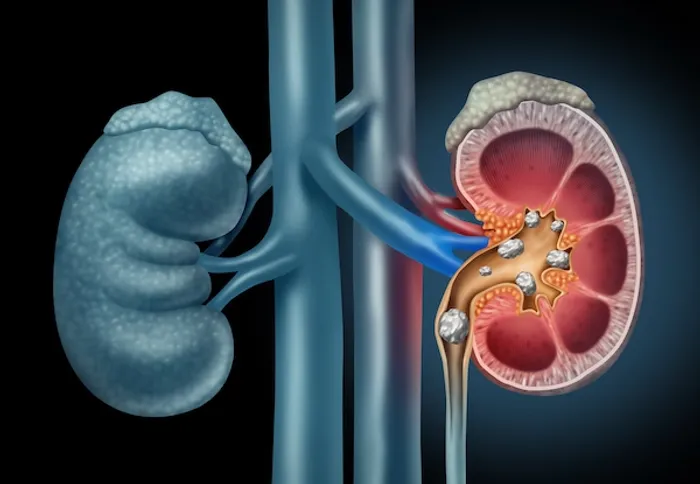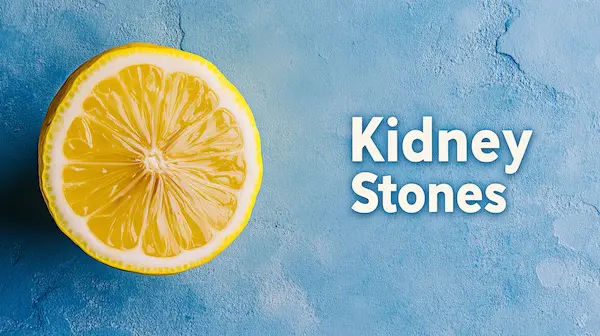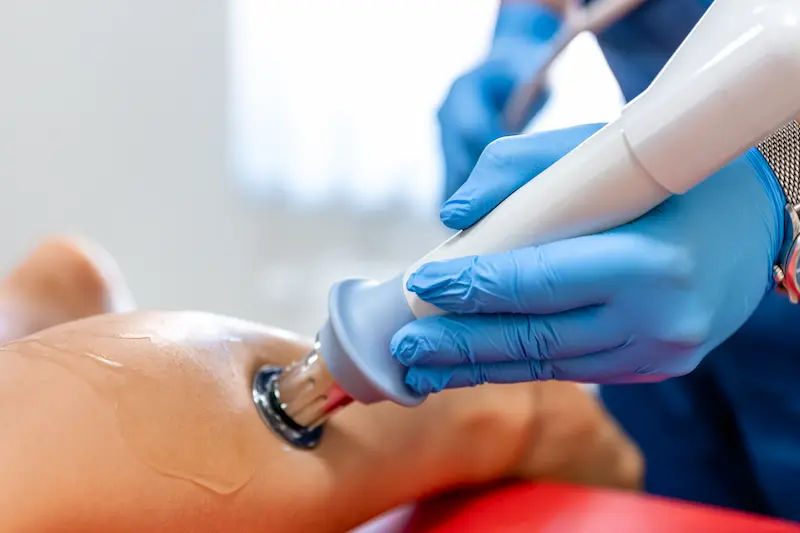Kidney Stone Pain Treatments and Remedies
Discover effective treatments and home remedies to relieve kidney stone pain, prevent recurrence, and support kidney health.

Written by Dr. Vasanthasree Nair
Reviewed by Dr. Rohinipriyanka Pondugula MBBS
Last updated on 13th Jan, 2026

Introduction
Few pains are as intense and sudden as the agony of a kidney stone. Often described as a sharp, stabbing, or cramping sensation in the back or side, it can radiate to the lower abdomen and groin, bringing even the toughest individuals to their knees. If you're reading this, you're likely searching for relief and fast. This comprehensive guide is designed to walk you through every step of managing and getting rid of kidney stone pain, from immediate at-home remedies to advanced medical treatments. We'll explore why this pain occurs, what you can do right now to ease the discomfort, and how to prevent future stones from forming. Understanding your options is the first step toward taking back control and finding the relief you desperately need.
Understanding the Agony: What Kidney Stone Pain Feels Like
The pain from a kidney stone, known as renal colic, is uniquely severe. It typically begins when a stone moves from the kidney into the narrow ureter, the tube connecting the kidney to the bladder. This movement causes a blockage, and pressure builds up in the kidney, triggering intense pain waves.
Why Do Kidney Stones Cause Such Severe Pain?
The pain isn't from the stone itself "scratching" you. It's from the ureter muscles spasming violently as they try to push the stone forward, combined with the pressure from urine backing up behind the blockage. This pressure stimulates nerve fibers that transmit extreme pain signals. The pain often comes in waves because the ureter contracts in rhythmic pulses.
Common Symptoms Accompanying the Pain
Beyond the classic flank pain, other symptoms almost always accompany a kidney stone episode. These include:
A persistent urge to urinate.
Painful urination (dysuria).
Pink, red, or brown urine (haematuria) indicating blood.
Cloudy or foul-smelling urine.
Nausea and vomiting due to shared nerve pathways.
Inability to findcomfortable position (restlessness).
Consult a Urologist for the best advice
Immediate First Steps: What to Do When Pain Strikes
When the kidney stone pain begins, your immediate goal is to manage the discomfort and help the stone pass.
Hydration: Your First and Most Important Weapon
Drink water and lots of it. Aim for 2-3 quarts per day. Proper hydration does two critical things: it dilutes the substances in urine that form stones, and more importantly, it creates a strong flow of urine that can help push the stone through your system. While water is best, mixing in some lemon water (citrate can help break down stones) is also beneficial.
Over-the-Counter Pain Relief Options
Nonsteroidal anti-inflammatory drugs (NSAIDs) like ibuprofen (Advil, Motrin) or naproxen (Aleve) are typically more effective for kidney stone pain relief than acetaminophen (Tylenol). This is because they not only reduce pain but also combat the inflammation in the ureter caused by the stone. Always follow dosage instructions and consult a pharmacist if you have underlying health conditions.
The Soothing Power of Heat Therapy
Applying a heating pad or hot water bottle to your back or side can provide significant relief. The heat helps to relax the muscles of the ureter, which can reduce the spasms that are causing the intense cramping pain. A warm bath can also offer a similar soothing effect.
Medical Interventions for Persistent Pain and Stones
If home care isn't enough, medical help is crucial.
Prescription-Strength Pain Medications
For severe pain that doesn't respond to OTC medication, doctors may prescribe stronger pain relievers, often opioids like morphine or tramadol, for short-term use in the emergency room or at home.
Alpha-Blockers: Medication to Help Pass the Stone
Drugs like tamsulosin (Flomax) are not painkillers. They work by relaxing the muscles in the ureter and prostate, making it easier for the stone to pass. Studies show that alpha-blockers can significantly increase the chance of passing a kidney stone and reduce the time it takes.
When is Surgery Necessary? Common Procedures
If a stone is too large to pass (generally larger than 5-6mm), is causing ongoing obstruction, infection, or uncontrolled pain, a urologist will recommend a procedure:
Extracorporeal Shock Wave Lithotripsy (ESWL): Uses sound waves to break the stone into smaller pieces that can be passed in urine.
Ureteroscopy: A thin scope is passed through the urethra and bladder to the stone. The stone is then removed with a basket or laser-lithed into dust.
Percutaneous Nephrolithotomy (PCNL): A surgical procedure for very large stones, involving a small back incision to remove the stone directly from the kidney.
If your pain is severe and unmanageable, or if you experience fever with chills, it is a medical emergency. Consult a doctor online immediately with Apollo24|7 for urgent advice or to arrange further care.
Home Remedies and Natural Approaches to Support Passing
Natural remedies and home tips to help pass kidney stones:
The Truth About Lemon Juice and Apple Cider Vinegar
Lemon juice is a recognized source of citrate, a compound that can prevent calcium-based stones from forming and may help break down existing ones. Adding a squeeze of fresh lemon to your water is a helpful preventive strategy. The evidence for apple cider vinegar is more anecdotal; while it is acidic, there is little scientific proof it dissolves stones, and its high acid content can be harmful to teeth and stomach if undiluted.
Gentle Movement: Can Exercise Help?
While you won't feel like running a marathon, light activity like walking can sometimes aid the process. Gravity and movement may help shift the stone downward through the ureter. However, listen to your body; if it exacerbates the pain, rest is better.
Preventing the Next Attack: Diet and Lifestyle Changes
Prevention is the best cure for avoiding future kidney stone pain.
Know Your Stone Type: The Key to Targeted Prevention
If you pass a stone, try to save it for analysis. The type (calcium oxalate, uric acid, struvite, cystine) dictates the best prevention plan. Apollo24|7 offers a convenient home collection for 24-hour urine tests that analyze your urine chemistry and help your doctor create a personalised plan.
Dietary Modifications to Significantly Reduce Risk
Stay Hydrated: This is non-negotiable. Drink enough water to produce at least 2.5 litres of urine a day.
Reduce Sodium: High sodium intake increases calcium in your urine, a primary driver for stones.
Moderate Oxalate-Rich Foods: If you form calcium oxalate stones, limit foods like spinach, nuts, tea, and chocolate.
Limit Animal Protein: Red meat, poultry, and fish increase uric acid and lower citrate levels.
Don't Cut Calcium: Dietary calcium from food binds with oxalate in the gut. Avoid calcium supplements unless directed by a doctor.
Get Your Health Assessed
When It's an Emergency: Recognizing Red Flags
Seek immediate medical attention if you experience:
Pain so severe you cannot sit still or find comfort.
Pain accompanied by nausea, vomiting, fever, or chills. This could indicate a serious infection.
Difficulty passing any urine at all.
Blood in your urine that is heavy or persistent.
Conclusion: Taking Control of Your Kidney Health
Experiencing a kidney stone is a painful ordeal, but it's one you can manage and overcome. By understanding the steps to get rid of kidney stone pain, from quick home remedies to knowing when to seek professional help, you empower yourself to navigate this challenge effectively. More importantly, by adopting the preventive measures outlined here, you can significantly reduce the risk of a recurring episode. Your daily habits, especially staying well-hydrated, are your strongest defense. If you have a history of stones or are at high risk, don' hesitate to seek professional guidance for a long-term management plan.
Frequently Asked Questions (FAQs) About Kidney Stone Pain
Below are the FAQs:
1. How long does it take to pass a kidney stone?
A. The time frame varies drastically based on the stone's size and location. Small stones (<4mm) may pass in a week or two. Larger stones (5-6mm) can take much longer and may require intervention. Stones larger than 6mm often need medical help to pass.
2. What is the best position to sleep in to relieve kidney stone pain?
A. Sleeping on the side that isn't causing pain can help reduce pressure on the affected ureter and kidney. If the pain is central, sleeping propped up with pillows may provide some relief.
3. Can certain drinks make kidney stone pain worse?
A. Yes. Sugary sodas, especially those high in high-fructose corn syrup, can increase stone risk. Drinks high in oxalates, like dark beers and black tea, might also contribute to stone formation in susceptible people. Water is always the best choice.
4. What's the difference between kidney stone pain and regular back pain?
A. Kidney stone pain is often more acute, colicky (comes in waves), and is not typically relieved by changing position. Muscle back pain is often a dull ache that is related to movement and can be eased with rest or specific positions.
5. Is it safe to try and "flush" a kidney stone with excessive water?
A. While hydration is critical, excessive water intake in a short period (water intoxication) is dangerous. Aim for consistent, high intake throughout the day (2-3 quarts total) rather than forcing large volumes all at once.
Consult a Urologist for the best advice
Consult a Urologist for the best advice

Dr. Prabir Basu
Urologist
19 Years • MBBS, MS General Surgery, DNB Genito-Urinary Surgery
Jodhpur Park
Dr. Prabir Basu urology clinic, Jodhpur Park
(200+ Patients)
Dr. Mohammed Rehan Khan
Urologist
8 Years • MBBS, MS (General Surgery), Mch (Urology)
Barasat
Diab-Eat-Ease, Barasat
Dr Debanga Sarma
Urologist
10 Years • MBBS, MS (GENERAL SURGERY)M.Ch (UROLOGY)
Guwahati
Apollo Clinic Guwahati, Assam, Guwahati
Dr S K Singhanina
Urologist
25 Years • MBBS/MS/DNB AND MCH UROLOGY
Guwahati
Apollo Clinic Guwahati, Assam, Guwahati
Dr P K Bagchi
Urologist
10 Years • MBBS, MS (Gen. Surgery) M. Ch. (Urology)
Guwahati
Apollo Clinic Guwahati, Assam, Guwahati




